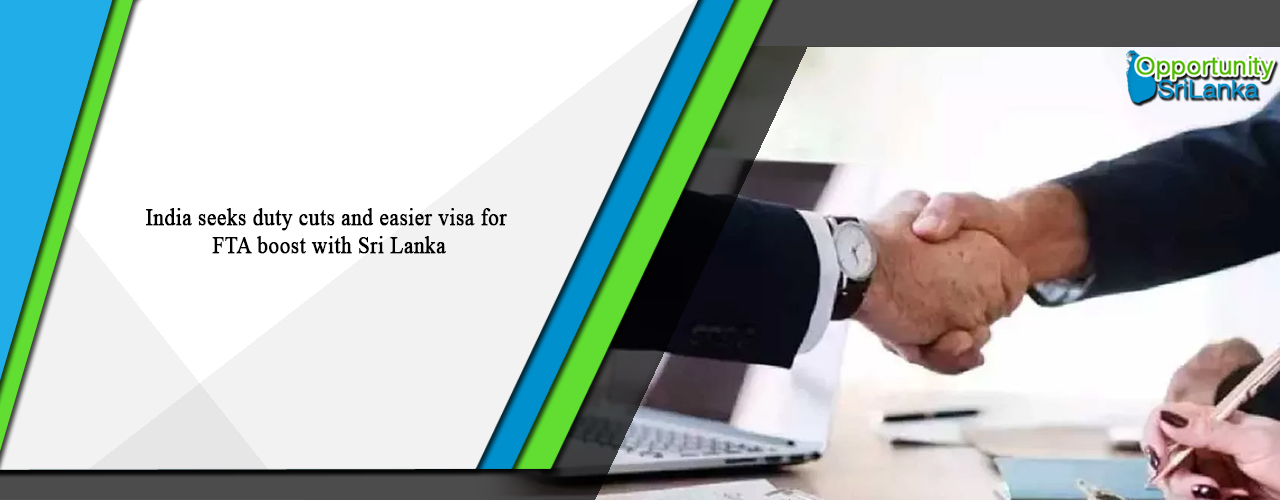India seeks duty cuts and easier visa for FTA boost with Sri Lanka
Press Trust of India: India is seeking customs duty concessions on a number of goods including cars, commercial vehicles and machinery from Sri Lanka under a comprehensive free trade agreement (FTA), talks for which are underway, an official said.
India has also sought easier visa norms to further facilitate entry of professionals from here, the official said.
The 14th round of talks between senior officials of India and Sri Lanka was concluded recently in Colombo.
Issues which came up for the talks included rules of origin, goods, services, and technical barriers for trade.
On the other hand, Sri Lanka has sought removal of a quota on apparel exports to India. The island nation is also asking for duty concessions on tea and certain agricultural commodities.
The official said that as elections are announced in Sri Lanka, the next round of negotiations between the two countries will be held after that.
The two nations have already implemented a free trade agreement in goods and now they are negotiating to expand the pact by including more goods and services.
The India-Sri Lanka Free Trade Agreement (ISFTA) came into force in March 2000. It enhanced economic relations between the two countries by reducing tariffs on a wide range of goods.
Since the original ISFTA focused solely on goods, both countries have been negotiating for several years to expand it into a Comprehensive Economic Partnership Agreement (CEPA), which would include services, investment, and other areas of economic cooperation.
Under the current FTA, India allowed limited imports of garments from Sri Lanka at a 50% tariff (or customs duty) concession for up to eight million pieces annually, with a requirement that six million of these pieces use Indian fabric.
Additionally, India offered a 50% tariff concession on up to 15 million kg of tea from Sri Lanka each year.
Think tank Global Trade Research Initiative (GTRI) said that Sri Lanka may be seeking removal of the quota on garments, especially considering that India has allowed duty-free imports of garments from Bangladesh under the South Asia Free Trade Agreement (SAFTA) for Least Developed Countries (LDCs).
“However, agreeing to this request may not be easy for India as allowing duty free imports has led to a significant increase in garment imports from Bangladesh, growing from $ 144.25 million in FY14 to $ 739.06 million in FY24, a cumulative growth of 412.34%,” GTRI Founder Ajay Srivastava said.
Sri Lanka has placed items like automobiles and electrical goods on its negative list, restricting their import.
Since the implementation of the ISFTA, trade between the two countries has experienced fair growth.
India’s exports to Sri Lanka increased from $ 499.3 million in the 2000 financial year, to $ 4.17 billion in FY24, a cumulative growth of 735.2%. Meanwhile, imports grew from $ 44.3 million to $ 1.4 billion over the same period.
In the last fiscal year, India’s key exports to Sri Lanka included petroleum products ($ 704 million), cotton ($ 260 million), pharmaceuticals ($ 255 million), refined sugar ($ 206 million), fabric ($ 223 million), machinery ($ 171 million), pepper ($ 90.9 million), car and motorcycle parts ($ 79.3 million), onions ($ 63.4 million), and pulses ($ 32 million).
Notably, India’s exports to Sri Lanka fell from $ 5.1 billion in FY23 to $ 4.17 billion in FY24, primarily due to a significant reduction in petroleum product exports, which declined from $ 1.78 billion to $ 704 million, GTRI said.
India’s major imports from Sri Lanka in FY24 were coffee ($ 103.7 million), garments ($ 55.65 million), animal feed ($ 72.2 million), areca nut ($ 65.5 million), light pepper ($ 44.4 million), rough diamonds ($ 26.9 million), and rubber ($ 26.7 million).
Apparel Export Promotion Council Southern Region in-charge A. Sakthivel said that India should not extend concessions for garments to Sri Lanka, as the domestic industry could be impacted because of that.
“We too make those garments and I think India should not give more concessions,” Sakthivel said.
OSL take:
Sri Lanka and India enjoy strong bilateral, trade and business ties that have been strengthened by an operational free trade agreement (FTA). These ties are expected to be further strengthened by the proposed Economic and Technology Comprehensive Agreement (ETCA) between the two countries. The latest move to further strengthen operations of the Sri Lanka-India FTA, would add to the expanding business/investment opportunities in Sri Lanka. However, Sri Lankan and Indian authorities have been engaged in a series of discussions to explore ways of further expanding the ties between the two countries while also looking at improving connectivity as well. The close proximity between Sri Lanka and India has also encouraged many Indian businesses/investors to engage in business ventures in Sri Lanka. The growth and profits recorded by these Indian businesses operating in Sri Lanka is indicative of the increasing business potential in Sri Lanka for more Indian businesses/investors to explore. With Sri Lanka’s strategic positioning in the Indian Ocean, the strong and expanding trade ties as well as the target of becoming a hub in the South Asian region have all expanded the business/investment opportunities in Sri Lanka. Given all these developments, more Indian businesses/investors could confidently explore the business/investment opportunities in Sri Lanka. Meanwhile, other foreign businesses/investors interested in doing business with India could look at setting up bases in Sri Lanka to engage with India using the preferential treatment enjoyed by Sri Lanka with India.

